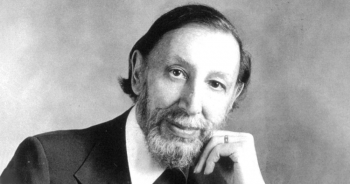Sudip Bose at The American Scholar:
 In 1942, the American composer Alan Hovhaness attended a master class at Tanglewood led by Bohuslav Martinů. In his early 30s at the time, Hovhaness had already written a considerable amount of music, including a symphony that the BBC Symphony Orchestra performed to some acclaim—the conductor of that concert, Leslie Heward, had proclaimed Hovhaness a “young genius.” Martinů’s class, however, was the province of Leonard Bernstein, Aaron Copland, and other such hungry wolves. One day, a recording of Hovhaness’s symphony was played, eliciting a response that was derisive in the extreme. Copland could barely listen, chatting loudly throughout. Bernstein was even crueler: when the symphony concluded, he went to the piano, played a mocking minor scale, and declared, “I hate this dirty ghetto music.”
In 1942, the American composer Alan Hovhaness attended a master class at Tanglewood led by Bohuslav Martinů. In his early 30s at the time, Hovhaness had already written a considerable amount of music, including a symphony that the BBC Symphony Orchestra performed to some acclaim—the conductor of that concert, Leslie Heward, had proclaimed Hovhaness a “young genius.” Martinů’s class, however, was the province of Leonard Bernstein, Aaron Copland, and other such hungry wolves. One day, a recording of Hovhaness’s symphony was played, eliciting a response that was derisive in the extreme. Copland could barely listen, chatting loudly throughout. Bernstein was even crueler: when the symphony concluded, he went to the piano, played a mocking minor scale, and declared, “I hate this dirty ghetto music.”
Hovhaness fled Martinů’s class, humiliated and chastened. On more than one previous occasion, he had responded to criticism with self-flagellation, destroying hundreds of early manuscripts in total. But he was also convinced about the correctness of his artistic aims.
more here.
